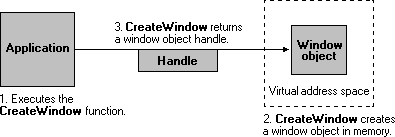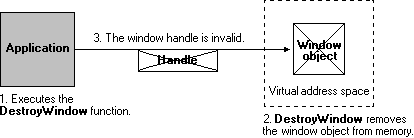
User and Graphics Device Interface Objects
User and GDI objects support only one handle per object. Processes cannot inherit or duplicate handles to user or GDI objects.
Handles to user objects are public to all processes. That is, any process can use the user object handle, provided that the process has access to the object as defined by user security. For more information about security, see Security.
Handles to GDI objects are private to a process. That is, only the process that created the GDI object can use the object handle.
In the following illustration, an application creates a window object. The CreateWindow function creates the window object and returns an object handle.

After the window object has been created, the application can use the window handle to display or change the window. The handle remains valid until the window object is destroyed.
In the next illustration, the application destroys the window object. The DestroyWindow function removes the window object from memory, which invalidates the window handle.

The following table lists the Windows user objects and each object's creator and destructor functions. The creator functions either create the object and an object handle or simply return the existing object handle. The destructor functions remove the object from memory, which invalidates the object handle.
Note that the window station and desktop objects are created and maintained by the system; applications cannot delete these objects.
User Objects
| Object | Creator function | Destructor function |
| Accelerator table | CreateAcceleratorTable | DestroyAcceleratorTable |
| Cursor | CreateCursor, LoadCursor, GetCursor, SetCursor | DestroyCursor |
| DDE conversation | DdeConnect, DdeConnectList, DdeQueryNextServer, DdeReconnect | DdeDisconnect, DdeDisconnectList |
| Desktop | GetThreadDesktop | |
| Hook | SetWindowsHook, SetWindowsHookEx | UnhookWindowsHook, UnhookWindowsHookEx |
| Menu | CreateMenu, CreatePopupMenu, GetMenu, GetSubMenu, GetSystemMenu, LoadMenu, LoadMenuIndirect | DestroyMenu |
| Window | CreateWindow, CreateWindowEx, CreateDialogParam, CreateDialogIndirectParam, CreateMDIWindow, FindWindow, GetWindow, GetClipboardOwner, GetDesktopWindow, GetDlgItem, GetForegroundWindow, GetLastActivePopup, GetOpenClipboardWindow, GetTopWindow, WindowFromDC, WindowFromPoint, and others | DestroyWindow |
| Window position | BeginDeferWindowPos | EndDeferWindowPos |
| Window station | GetProcessWindowStation |
The following table lists the Windows GDI objects and each object's creator and destructor functions. The creator functions either create the object and an object handle or simply return the existing object handle. The destructor functions remove the object from memory, which invalidates the object handle.
GDI Objects